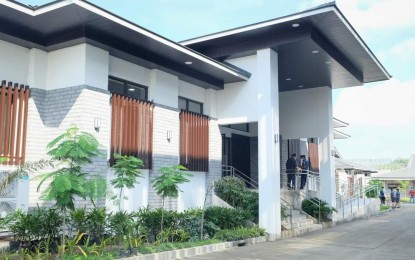
(Photo courtesy of JICA Philippines)
MANILA – A new five-hectare, 480-bed capacity Drug Abuse Treatment and Rehabilitation Center (DATRC) was inaugurated in Barangay Osorio, Trece Martires City, Cavite last June 14 to help drug dependents and provide immediate interventions toward rehabilitation, the Department of the Interior and Local Government (DILG) said on Friday.
“Our journey towards bringing our illegal drug dependent kababayans closer to reintegration and recovery is now closer to reality with this five-hectare DATRC here in Cavite. This is another part of the Duterte Legacy that has truly impacted the lives of our fellow Filipinos,” Interior Secretary Eduardo Año said in a news release.
As the chair of the DATRC Interagency Task Force, he thanked President Rodrigo Roa Duterte for being firm in putting an end to the illegal drug menace in the country paving the way to innovations such as the DATRC and the Community-based Drug Rehabilitation Program (CBDRP).
He said the President’s directives to concerned government instrumentalities to strictly enforce drug laws and establish and implement different policies and programs help former drug dependents overcome addiction and rebuild their lives.
“With his tapang at malasakit (courage and compassion) brand of leadership, President Duterte mobilized the Philippine National Police, Philippine Drug Enforcement Agency (PDEA), and other allied government instrumentalities to wage a full-blown campaign to crack down the illegal drug market and stop the distribution of illegal substances from different parts of the country,” Año said.
Republic Act 9165, otherwise known as the “Comprehensive. Dangerous Drugs Act of 2002”, provides that the state must provide effective mechanisms or measures to re-integrate into society individuals who have fallen victims to drug abuse or dangerous drug dependence through sustainable programs of treatment rehabilitation.
“Through interventions such as CBDRP and DATRC, we are widening our reach and capacities to cater to more individuals who silently yet desperately need our help,” Año said.
The new DATRC is a part of the PHP846-million program grant of the Japan International Cooperation Agency (JICA) called “Consolidated Rehabilitation of Illegal Drug Users” (CARE), which is in line with the Japan-Philippines Joint Statement on Bilateral Cooperation to combat illegal drugs.
Built on a five-hectare land donated by the provincial government of Cavite, the DATRC can accommodate 400 male and 80 female patients from South and Central Luzon, who have high-risk drug dependence and are willing to undergo treatment and rehabilitation in an in-patient facility. It will be run by the Department of Health.
The DATRC has complete amenities and facilities such as Processing Building, Medical, and Admin Building, Family Waiting Area, Reception/Information, Nurse’s Station, Observation Room, Conference room, Office of the TRC Chief, Visitors building, Garden, Prayer hall, Covered Walkway, Male/Female Patient Dormitory, Activity Center, Training Building, Staff dormitory, Transition Dormitory, and Activity Center.
According to the Department of Health (DOH), the DATRC in Calabarzon will be the apex or end-referral of all rehabilitation centers in the country with the DOH’s Formula One Plus strategic pillar in the health service delivery network.
As of March 2022, there are a total of 74 accredited government and private DATRCs in the country. Of this number, 12 are residential government-owned (DOH-managed), eight are residential and LGU-managed, six are residential with outpatient service (DOH-managed), one non-residential government-owned (DOH-managed), four non-residential (LGU-managed), 41 private residential, and two private non-residential.
Partners in drug rehab
Año also acknowledged the government’s partners, including JICA, for their unwavering perseverance to establish more drug rehabilitation centers all over the country and commitment to envisioning a safe and drug-free Philippines.
“We thank our partners for persevering and pushing for the establishment of more drug rehabilitation centers all over the country. Through similar concerted efforts now and in the future, I am confident that more and more Filipinos will see the truth behind the success of drug rehabilitation, help dispel their fears and doubts, and normalize the act of seeking help and treatment for drug dependence in the country,” he said.
The inauguration was also led by JICA Representative to the Philippines Sakamoto Takema, Deputy Executive Secretary for Internal Audit Ricojudge Janvier Echiverri, Dangerous Drugs Board Undersecretary Gilbert Cruz, Department of Social Welfare and Development Undersecretary Joseline Niwane, DILG Undersecretary Epimaco Densing III, and Trece Martires City Mayor Gemma Lubigan. (PR)
